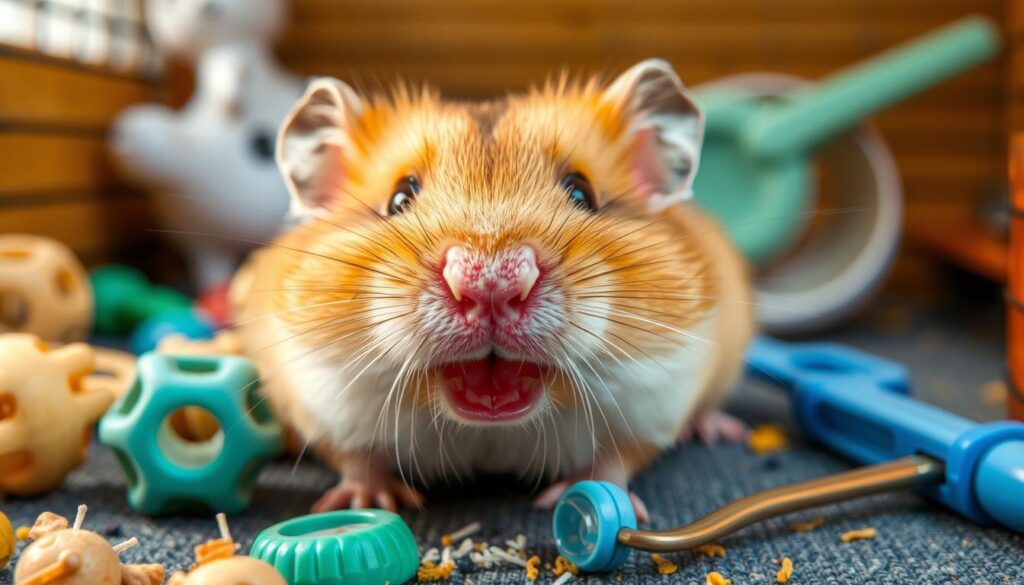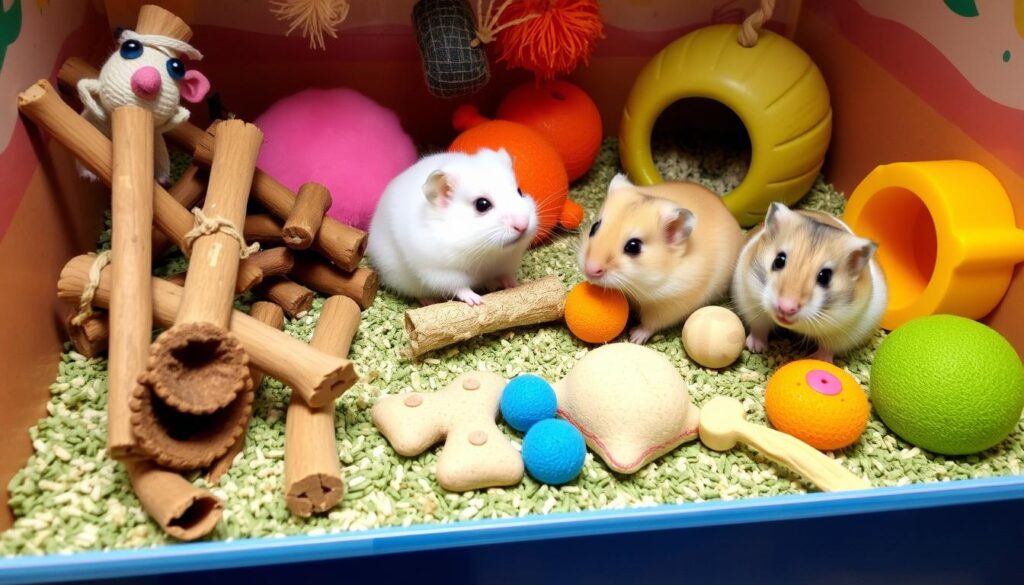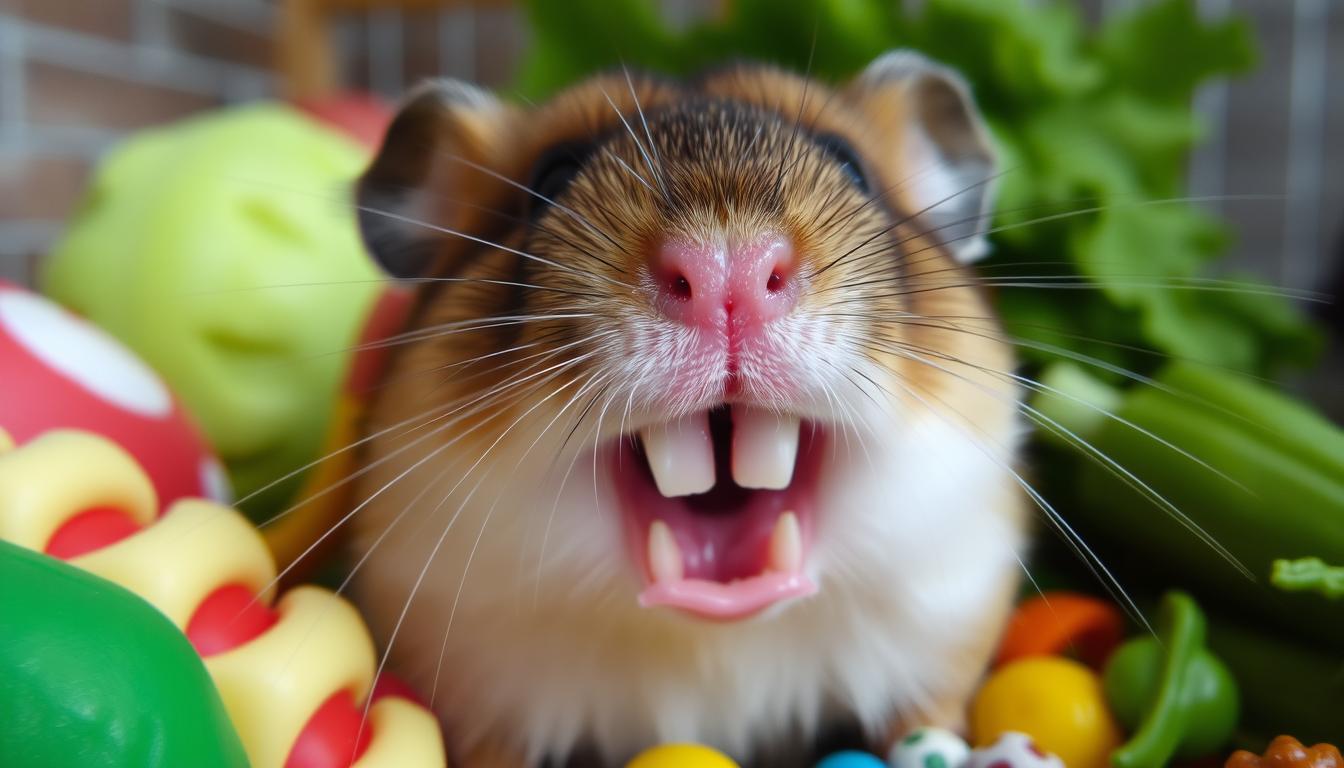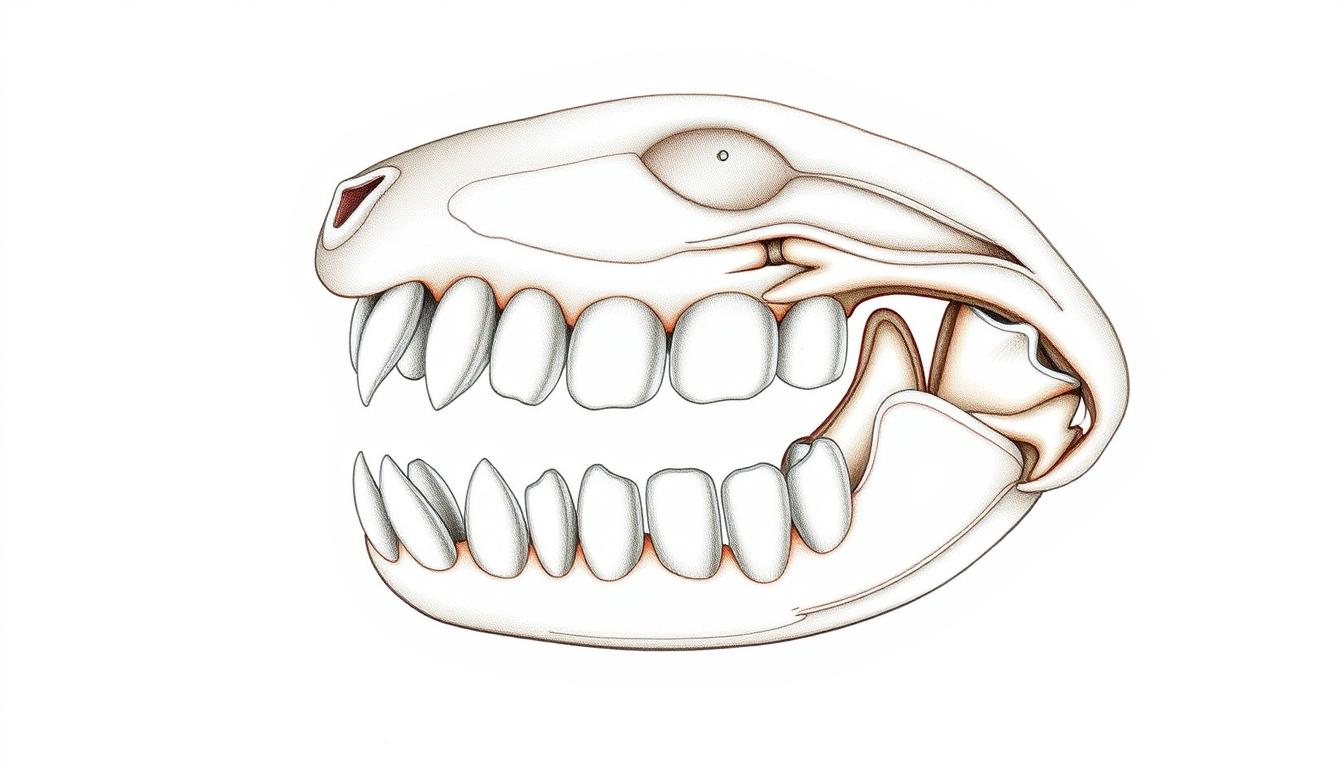Are your hamster’s teeth causing you concern? Have you noticed unusual grinding or difficulty chewing? The health of a hamster’s teeth is crucial, yet many pet owners overlook this critical aspect of their furry friend’s wellbeing. In this comprehensive guide, we’ll uncover the signs of unhealthy hamster teeth and provide practical solutions to keep your hamster’s smile in top condition.
Key Takeaways
- Unhealthy hamster teeth can lead to painful chewing difficulties and other health issues.
- Understanding the growth and structure of hamster teeth is essential for maintaining dental health.
- Recognizing the signs of overgrown or misaligned teeth, such as excessive drooling, can help you address problems early.
- Providing appropriate chew toys and monitoring your hamster’s diet and nutrition are key preventative measures.
- Regular veterinary check-ups are crucial to ensure your hamster’s teeth remain healthy and problem-free.
Understanding Hamster Dental Health
Keeping your hamster’s teeth healthy is key to their happiness. Hamsters’ teeth grow all the time and need to be chewed often. Knowing how their teeth grow helps you spot dental problems early and care for them right.
Hamster Teeth Growth and Structure
Hamsters have sharp incisors and molars for chewing hard food. Their teeth grow forever. Without regular chewing, their teeth can grow too long and cause health issues.
The Importance of Regular Chewing
Chewing is vital for hamster teeth health. It keeps their teeth from getting too long and painful. Giving your hamster chew toys and fibrous foods helps keep their teeth in check.
“Proper hamster tooth filing and care is crucial for their overall health and well-being.”
Knowing what hamsters need for their teeth helps you keep them healthy. This way, your hamster can stay happy and healthy for a long time.
Signs of Unhealthy Hamster Teeth
It’s important for pet owners to know the signs of unhealthy hamster teeth. These dental issues can make your pet uncomfortable and lead to serious health problems if not treated. Recognizing these signs early helps you take action against overgrown hamster teeth, hamster malocclusion, and other hamster dental problems.
Overgrown or Misaligned Teeth
One common sign of dental issues in hamsters is overgrown or misaligned teeth. Since hamsters’ teeth grow continuously, they need to chew regularly to keep them in check. If they can’t, their teeth can grow too long and become misshapen. This can make eating hard for your hamster and lead to more problems.
Excessive Drooling or Difficulty Eating
Another sign of unhealthy hamster teeth is excessive drooling or trouble eating. If your hamster has trouble chewing or swallowing, it might have dental issues. Drooling too much can also mean your hamster is in pain or discomfort due to hamster malocclusion or other hamster dental problems.
| Symptom | Description |
|---|---|
| Overgrown or Misaligned Teeth | Continuously growing and misshapen teeth that can make eating difficult |
| Excessive Drooling | Excessive salivation, often a sign of discomfort or pain caused by dental issues |
| Difficulty Eating | Struggling to chew or swallow food, indicating potential dental problems |
By watching for these signs and treating any hamster dental problems quickly, you can keep your pet healthy. Regular vet visits and good dental care are key to your hamster’s oral health.

Causes of Unhealthy Hamster Teeth
Keeping hamster teeth healthy is key to their well-being. But, several factors can lead to dental issues. Knowing what causes these problems is the first step to solving them.
One main reason for hamster teeth grinding is a bad diet. Hamsters’ teeth grow all their lives. They need foods that are high in fiber and rough to chew on. Without these, their teeth can grow too long or get crooked, making eating hard.
- Insufficient chewing materials: Hamsters need chew toys like wooden blocks, hay, and cardboard to keep their teeth in check.
- Genetic predisposition: Some hamsters might be born with a higher risk of dental problems, like teeth that don’t line up right.
- Lack of dental care: Not taking your hamster for regular vet visits and dental checks can lead to unhealthy teeth.
Knowing why hamsters get dental problems helps owners prevent and fix these issues. This way, their pets can have healthy, happy teeth.
| Cause | Description |
|---|---|
| Improper Diet | Hamsters need a diet full of fiber and chew toys to keep their teeth healthy. |
| Lack of Chewing Materials | Wooden blocks, hay, and cardboard are key for hamsters to wear down their teeth. |
| Genetic Predisposition | Some hamsters might be more likely to have dental problems, like teeth that don’t fit right. |
| Neglected Dental Care | Not getting regular vet visits and dental exams can cause unhealthy hamster teeth. |
By tackling the root causes of hamster teeth grinding, owners can help their pets have healthy teeth for their whole lives.
Preventative Measures for Healthy Teeth
Keeping your hamster’s teeth healthy is key. Taking steps early can stop problems before they start. Giving your hamster the right chew toys is a big help.
Providing Appropriate Chew Toys
Hamsters’ teeth grow all the time. They need to chew to keep their teeth short and healthy. Wooden blocks, hay-based toys, and other safe items are great for this.
These toys not only prevent tooth issues but also keep your hamster’s mind sharp.
Monitoring Diet and Nutrition
Right chew toys are just part of the solution. Watching what your hamster eats is also important. A balanced diet full of vitamins and fiber keeps their teeth strong.
By doing these things, your hamster can live a long, happy life with healthy teeth.

“Chewing is not just a hobby for hamsters – it’s essential for their dental health.”
Conclusion
Keeping your hamster’s teeth healthy is very important. You need to know the signs of bad teeth, why they happen, and how to stop them. This way, your hamster can chew comfortably for years.
It’s also key to take your hamster to the vet regularly. This helps catch and fix dental problems early. This is good for your hamster’s health overall.
Give your hamster chew toys that are safe and fun. Watch what they eat and look for any dental issues. With the right care, your hamster can stay happy and healthy.
It’s everyone’s job to keep your hamster’s teeth in good shape. By being informed and proactive, you help your pet stay healthy and happy. With the right care, your hamster will have strong teeth for a long, happy life.
FAQ
What are the signs of unhealthy hamster teeth?
Signs of unhealthy hamster teeth include overgrown or misaligned teeth. You might also see excessive drooling or difficulty eating. These signs often mean your hamster has dental problems.
What causes unhealthy hamster teeth?
Several things can cause unhealthy hamster teeth. An improper diet and lack of chew toys are big factors. Genetics also play a role, especially in teeth grinding.
How can I prevent hamster tooth issues?
To prevent tooth issues, give your hamster the right chew toys. Watch their diet and make sure they get the nutrients they need. Regular vet visits are also key.
How do I care for my hamster’s teeth?
To care for your hamster’s teeth, trim or file them if they’re too long. Give them chew toys to keep their teeth healthy and trimmed.
What should I do if my hamster has dental problems?
If your hamster shows signs of dental problems, take them to the vet. A vet can check and treat the issue. Quick action can help prevent more problems.


